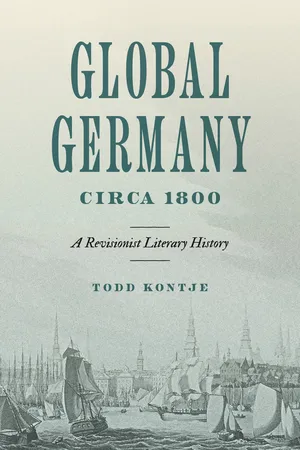
- English
- PDF
- Available on iOS & Android
About this book
Global Germany Circa 1800 asks two interrelated questions: How did Germans participate in the European conquest of the world, and how were they different from other imperial powers? In other words, what is the relation between the German form of empire, the old Reich, and the modern European empires that emerged in the global age?
In this book, Todd Kontje presents a revisionist literary and intellectual history, inviting readers to consider how we might understand "Germany" at the turn of the nineteenth century if we remove the nation-state as the inevitable goal of cultural and political development. Focusing on the pivotal years around 1800, when many of the concepts that define the modern era first came into being, Kontje investigates how thinkers in and around Weimar—from Goethe, Schiller, and Kant to Georg Forster, Heinrich von Kleist, and Alexander von Humboldt—worked within existing political structures to make sense of the region's place in the world. Ultimately, he reveals how Weimar, a remote artist hub long thought to exemplify the insularity of a soon-to-be-unified nation, was in fact utterly worldly, and in a manner very different from the political capitals of imperial nation-states like London and Paris.
Accessible and entertaining, this literary history is essential reading for German studies students and scholars, and it will appeal to audiences in world history, empire studies, intellectual history, and comparative literature.
Frequently asked questions
- Essential is ideal for learners and professionals who enjoy exploring a wide range of subjects. Access the Essential Library with 800,000+ trusted titles and best-sellers across business, personal growth, and the humanities. Includes unlimited reading time and Standard Read Aloud voice.
- Complete: Perfect for advanced learners and researchers needing full, unrestricted access. Unlock 1.4M+ books across hundreds of subjects, including academic and specialized titles. The Complete Plan also includes advanced features like Premium Read Aloud and Research Assistant.
Please note we cannot support devices running on iOS 13 and Android 7 or earlier. Learn more about using the app.
Information
Table of contents
- COVER Front
- Copyright Page
- Table of Contents
- Acknowledgments
- Introduction
- Notes to Introduction
- Chapter 1: The World in Letters
- Notes to Chapter 1
- Chapter 2: The World in Motion
- Notes to Chapter 2
- Chapter 3: Goethe’s Journey to the Center of the Earth
- Notes to Chapter 3
- Chapter 4: Schiller and the Drama of Empire
- Notes to Chapter 4
- Chapter 5: Kleist and the Revolution
- Notes to Chapter 5
- Chapter 6: Alexander von Humboldt and the Anthropocene
- Notes to Chapter 6
- Notes
- Bibliography
- Index